easyJet Bundle
Who Really Owns easyJet?
In the fast-paced world of aviation, understanding the ownership structure of a major airline like easyJet is key to unlocking its strategic moves and future potential. From its humble beginnings to its current status as a leading European carrier, easyJet's ownership has evolved significantly. This exploration dives deep into the easyJet SWOT Analysis to uncover the key players shaping its destiny.
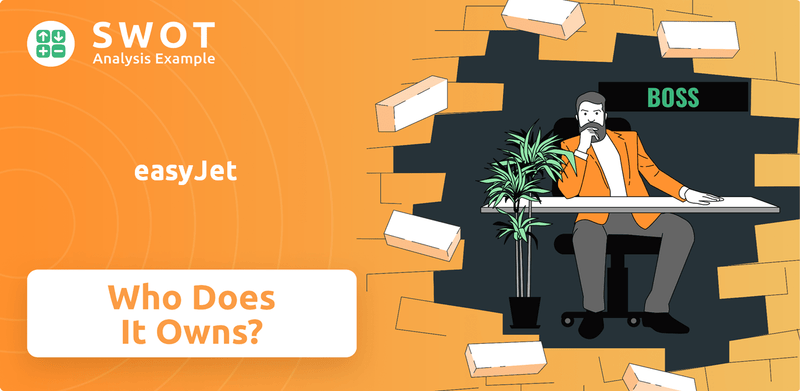
Knowing who owns easyJet, from its founder to its current shareholders, provides critical insights into its decision-making processes and financial health. The easyJet parent company and its ownership structure have changed dramatically since its inception by Sir Stelios Haji-Ioannou in 1995. Understanding who the major easyJet shareholders are and who runs easyJet is crucial for anyone looking to understand the airline's trajectory and assess its long-term viability, including its current CEO and their background.
Who Founded easyJet?
The establishment of easyJet in March 1995 marked the beginning of a new era in affordable air travel. Sir Stelios Haji-Ioannou, then aged 27, founded the airline with the vision of making flying accessible to a wider audience. His innovative approach and focus on cost-effectiveness quickly set easyJet apart in the aviation industry.
Initial funding for easyJet came from Sir Stelios's father, Loucas Haji-Ioannou, a Greek shipping tycoon, who provided approximately $8 million. This financial backing was crucial in launching the airline and supporting its early operations. The airline's initial strategy was to offer low-cost flights, a concept that was reflected in its early marketing campaigns.
easyJet's first flights took off from London Luton Airport in November 1995, connecting to Glasgow and Edinburgh. The airline's early operations involved leased planes, pilots, engineers, and other essential services. The company's headquarters, known as EasyLand, were located at London Luton Airport, with the airport providing the 15,000-square-foot building rent-free to support the new venture.
easyJet was founded in March 1995 by Sir Stelios Haji-Ioannou. The initial investment of around $8 million came from his father, Loucas Haji-Ioannou.
The airline's first flights began in November 1995, operating from London Luton Airport. Initially, easyJet used leased aircraft and services.
In April 1996, easyJet acquired its first wholly-owned aircraft, a Boeing 737-300. This allowed the airline to launch its first international route to Amsterdam.
Sir Stelios, along with his siblings, Polys and Clelia, held significant stakes in the company. The early ownership structure was family-centric.
Sir Stelios conducted business through his private investment vehicle, easyGroup, which owns the 'easy' brand.
easyJet's headquarters, EasyLand, was provided rent-free by London Luton Airport.
The early ownership of easyJet was primarily centered around the Haji-Ioannou family. Sir Stelios Haji-Ioannou was the founder and owner, with his siblings also holding significant shares. This structure allowed for centralized decision-making and control during the airline's initial growth phase. For more details on the airline's history, you can read the Brief History of easyJet.
- Sir Stelios Haji-Ioannou founded easyJet.
- His father provided the initial funding.
- Siblings held significant stakes.
- The company used leased aircraft initially.
easyJet SWOT Analysis
- Complete SWOT Breakdown
- Fully Customizable
- Editable in Excel & Word
- Professional Formatting
- Investor-Ready Format
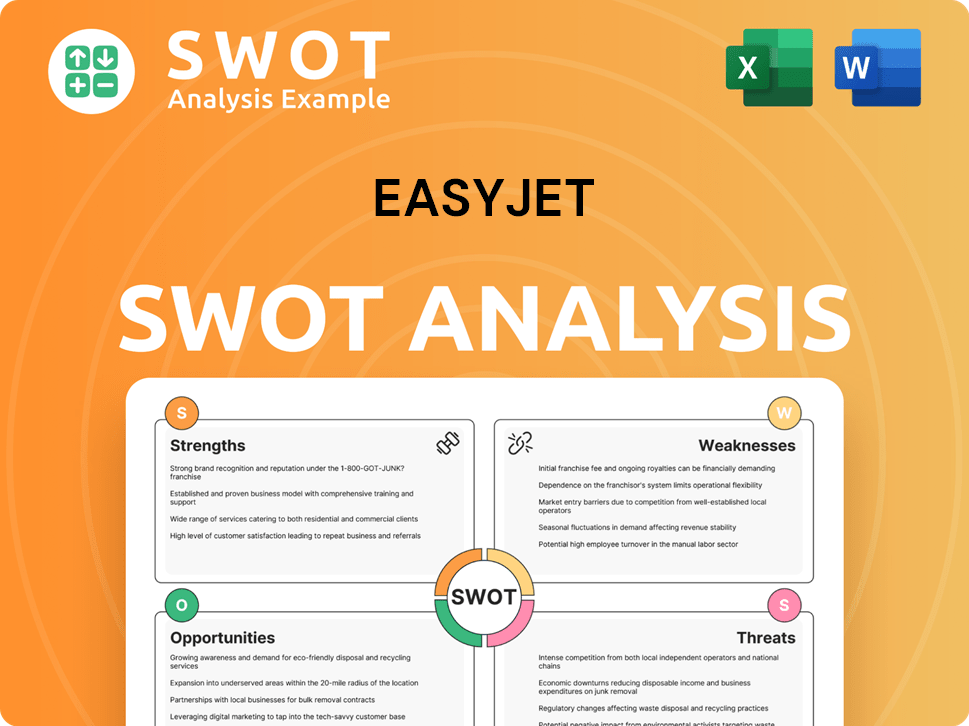
How Has easyJet’s Ownership Changed Over Time?
The evolution of easyJet ownership reflects its journey from a family-run enterprise to a publicly traded entity. Following its initial public offering (IPO) in 2000, the airline's ownership structure diversified significantly. This shift saw the dilution of the Haji-Ioannou family's stake, impacting their influence on the company's strategic decisions. The airline's history and ownership have been marked by these key transitions, reflecting the changing dynamics of the aviation industry and the company's growth.
As of July 2022, the Haji-Ioannou family held approximately 15.3% of easyJet, a notable decrease from earlier periods. This change was partly due to their decision not to participate in a rights issue in September 2021. This decision led to a reduction in their control over the company. Currently, easyJet's ownership is distributed among various institutional investors, with no single entity holding a majority stake. This distribution highlights the company's status as a publicly traded entity, with significant influence from major institutional shareholders.
| Shareholder | Percentage of Shares (July 2022) | Approximate Number of Shares |
|---|---|---|
| Haji-Ioannou Family | ~15.3% | ~11.73 million |
| Institutional Investors (Combined) | ~30.92% | ~234.4 million |
| Other Shareholders | ~53.78% | Undisclosed |
The current easyJet owner structure involves a mix of institutional investors and other shareholders, reflecting its status as a publicly listed company. Major institutional shareholders, including Ninety One UK Ltd. and Invesco Asset Management Ltd., play significant roles in shaping the airline's strategic direction. The company's financial performance in 2024, with revenue reaching £9,309 million, demonstrates its continued growth and resilience in the competitive aviation market. For more information about the company's target audience, you can read this article about the Target Market of easyJet.
easyJet ownership has evolved significantly since its founding, transitioning from family control to a publicly traded model.
- The Haji-Ioannou family remains a significant shareholder, though their stake has diluted over time.
- Institutional investors hold a substantial portion of the shares, influencing the company's strategic direction.
- easyJet's financial performance in 2024 showed strong revenue growth, indicating its continued success.
- The company operates a fleet of 347 airplanes as of September 30, 2024.
easyJet PESTLE Analysis
- Covers All 6 PESTLE Categories
- No Research Needed – Save Hours of Work
- Built by Experts, Trusted by Consultants
- Instant Download, Ready to Use
- 100% Editable, Fully Customizable
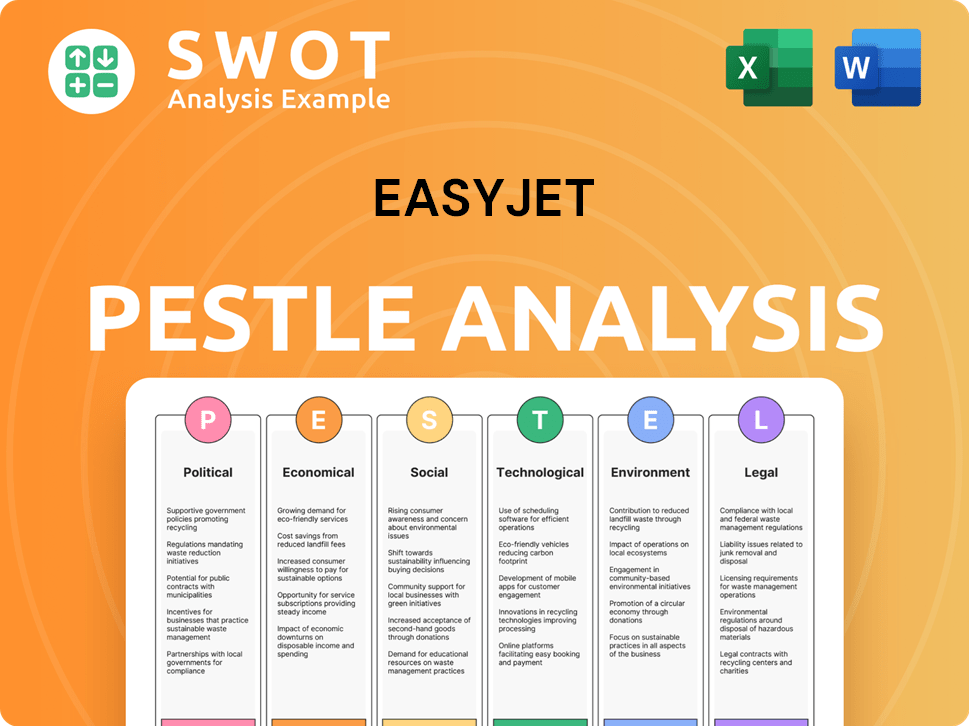
Who Sits on easyJet’s Board?
The current board of directors at easyJet plc is pivotal in steering the company's governance and strategic direction. As of January 2025, the leadership includes Kenton Jarvis as Chief Executive Officer, succeeding Johan Lundgren who served as CEO until December 31, 2024. Sir Stephen Hester serves as the Non-Executive Chairman. Jan De Raeymaeker assumed the role of Chief Financial Officer of the Group on January 20, 2025. The board also includes directors from easyJet Airline Company Limited, the main operating subsidiary, with other directors attending meetings by invitation.
The composition of the board and their roles reflect the company's commitment to effective governance. The directors of easyJet Airline Company Limited, including Kenton Jarvis and Jan De Raeymaeker, are integral members of the easyJet plc Board. This structure ensures alignment between the operational and strategic aspects of the airline. The board's focus is on delivering long-term value to stakeholders, a key objective in its decision-making processes.
| Board Member | Position | Start Date |
|---|---|---|
| Kenton Jarvis | Chief Executive Officer | January 2025 |
| Sir Stephen Hester | Non-Executive Chairman | N/A |
| Jan De Raeymaeker | Chief Financial Officer | January 20, 2025 |
The influence of major shareholders is a significant aspect of easyJet's ownership structure. While specific details on dual-class shares are not emphasized, the Haji-Ioannou family remains a notable shareholder group, even with a diluted stake. Institutional investors such as Ninety One UK Ltd., Invesco Asset Management Ltd., and The Vanguard Group are key stakeholders, influencing strategic decisions. These investors' involvement underscores confidence in the airline's future and influences operational decisions. Understanding the competitive landscape is crucial for assessing the company's position.
The major shareholders, including the Haji-Ioannou family and institutional investors, play a vital role in easyJet's strategic direction.
- The Haji-Ioannou family remains a significant shareholder.
- Institutional investors like Ninety One UK Ltd., Invesco Asset Management Ltd., and The Vanguard Group are key stakeholders.
- These shareholders influence strategic decisions and demonstrate confidence in the airline's future.
- The board is focused on delivering long-term value to its stakeholders.
easyJet Business Model Canvas
- Complete 9-Block Business Model Canvas
- Effortlessly Communicate Your Business Strategy
- Investor-Ready BMC Format
- 100% Editable and Customizable
- Clear and Structured Layout
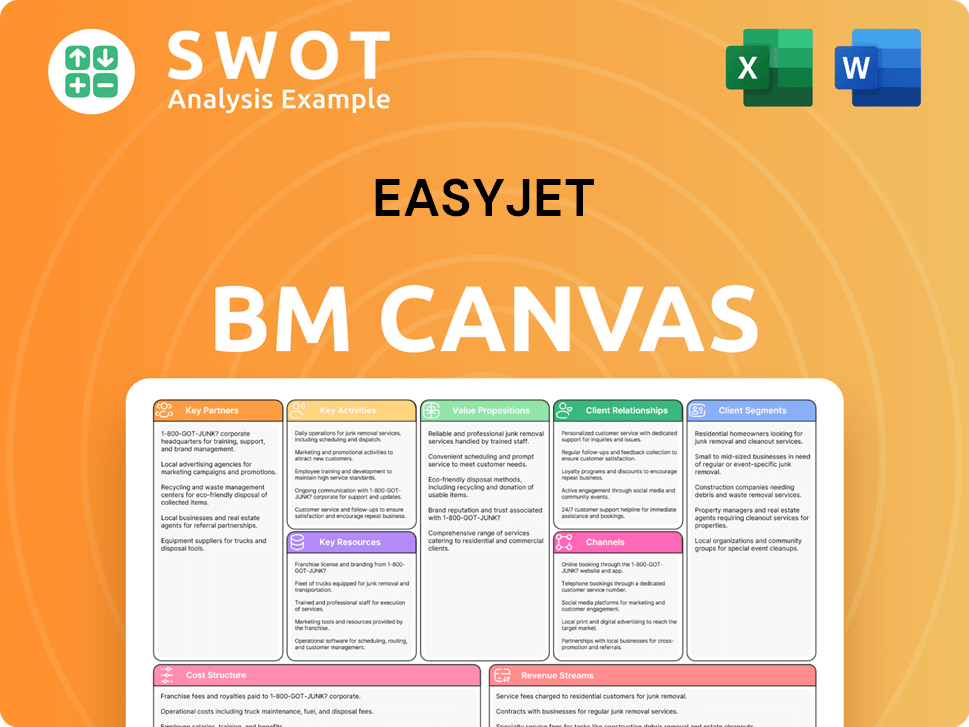
What Recent Changes Have Shaped easyJet’s Ownership Landscape?
In the past few years, easyJet ownership has navigated significant challenges and changes. The airline industry, including easyJet, faced unprecedented disruption from the COVID-19 pandemic. easyJet responded by securing a £600 million loan from the UK Government in April 2020 and raising over £2.4 billion in new finance. These measures were crucial in weathering the initial impact of the pandemic and ensuring the company's survival.
Despite these financial pressures, easyJet has demonstrated resilience and a commitment to growth. The airline has focused on fleet modernization, announcing a deal in October 2023 to purchase 257 new Airbus jets, with an option for 100 more A321neo jets. As of March 31, 2025, the fleet comprised 355 aircraft, with eight new neo family aircraft delivered in the six months prior. easyJet anticipates substantial growth in owned assets, projecting an increase of more than 60% by FY28, with 82% of its Neo aircraft already owned. This strategic focus on fleet renewal and expansion underscores easyJet's long-term vision and commitment to operational efficiency.
| Metric | 2024 | 2025 (H1) |
|---|---|---|
| Total Revenue | £9,309 million | £3.53 billion |
| Headline Profit Before Tax | £610 million | N/A |
| Pretax Loss | N/A | £401 million |
| Seat Capacity Growth (FY25) | N/A | ~3% |
easyJet's financial performance showcases its recovery and strategic direction. The company reported record profit performance during summer 2024, with a 34% growth in headline profit before tax, reaching £610 million for the full financial year 2024. Total revenue for 2024 increased to £9,309 million. For the first half of the financial year ending March 31, 2025, easyJet's pretax loss widened to £401 million, although total revenue rose by 8.0% to £3.53 billion. The airline anticipates full-year seat capacity growth of approximately 3% year-on-year to about 103 million seats for financial year 2025. easyJet holidays, a growing segment, expects approximately 25% customer growth year-on-year.
The ownership structure of easyJet involves a mix of institutional investors and individual shareholders. While the precise breakdown changes over time, major institutional investors hold significant stakes in the company. This reflects a trend towards increased institutional ownership within the airline industry.
easyJet is not part of a larger parent company. It operates independently as a publicly traded company. This structure allows easyJet to make its own strategic decisions and respond directly to market dynamics. The airline is listed on the London Stock Exchange.
The primary easyJet shareholders include institutional investors and individual shareholders. The ownership structure is dynamic, with stakes changing based on market activity and investor decisions. Understanding the major shareholders provides insights into the company's investor base and potential strategic influences.
As of the latest updates, the easyJet CEO leads the company's strategic direction and operational management. The CEO's decisions and leadership significantly influence easyJet's financial performance and future prospects. The current CEO's background and experience are critical in shaping the company's trajectory.
easyJet Porter's Five Forces Analysis
- Covers All 5 Competitive Forces in Detail
- Structured for Consultants, Students, and Founders
- 100% Editable in Microsoft Word & Excel
- Instant Digital Download – Use Immediately
- Compatible with Mac & PC – Fully Unlocked
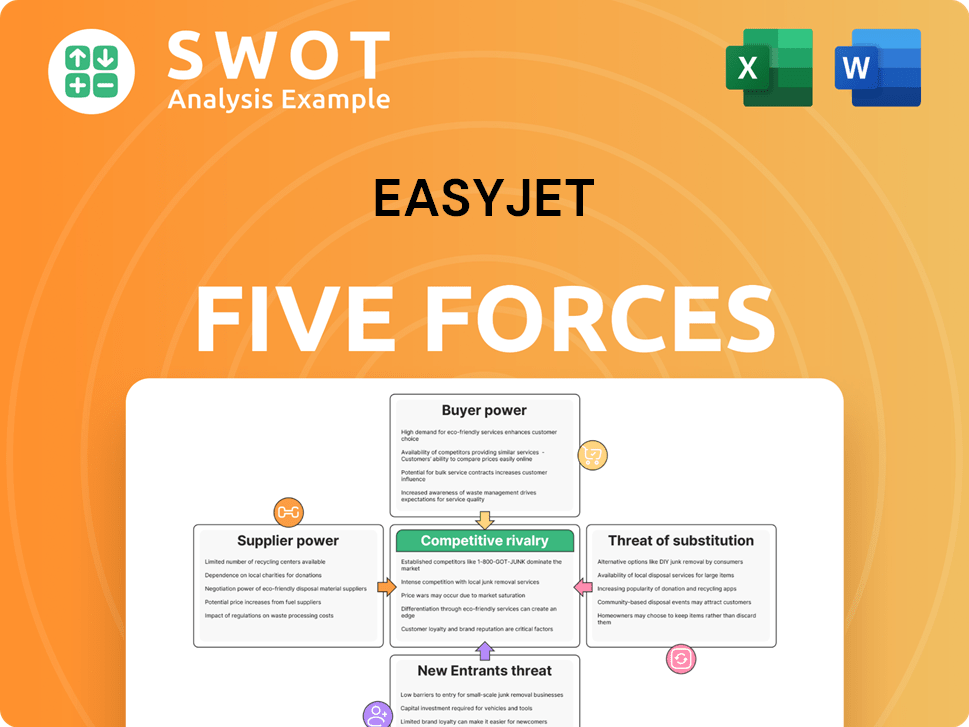
Related Blogs
- What are Mission Vision & Core Values of easyJet Company?
- What is Competitive Landscape of easyJet Company?
- What is Growth Strategy and Future Prospects of easyJet Company?
- How Does easyJet Company Work?
- What is Sales and Marketing Strategy of easyJet Company?
- What is Brief History of easyJet Company?
- What is Customer Demographics and Target Market of easyJet Company?
Disclaimer
All information, articles, and product details provided on this website are for general informational and educational purposes only. We do not claim any ownership over, nor do we intend to infringe upon, any trademarks, copyrights, logos, brand names, or other intellectual property mentioned or depicted on this site. Such intellectual property remains the property of its respective owners, and any references here are made solely for identification or informational purposes, without implying any affiliation, endorsement, or partnership.
We make no representations or warranties, express or implied, regarding the accuracy, completeness, or suitability of any content or products presented. Nothing on this website should be construed as legal, tax, investment, financial, medical, or other professional advice. In addition, no part of this site—including articles or product references—constitutes a solicitation, recommendation, endorsement, advertisement, or offer to buy or sell any securities, franchises, or other financial instruments, particularly in jurisdictions where such activity would be unlawful.
All content is of a general nature and may not address the specific circumstances of any individual or entity. It is not a substitute for professional advice or services. Any actions you take based on the information provided here are strictly at your own risk. You accept full responsibility for any decisions or outcomes arising from your use of this website and agree to release us from any liability in connection with your use of, or reliance upon, the content or products found herein.